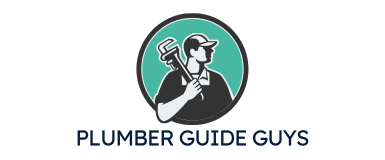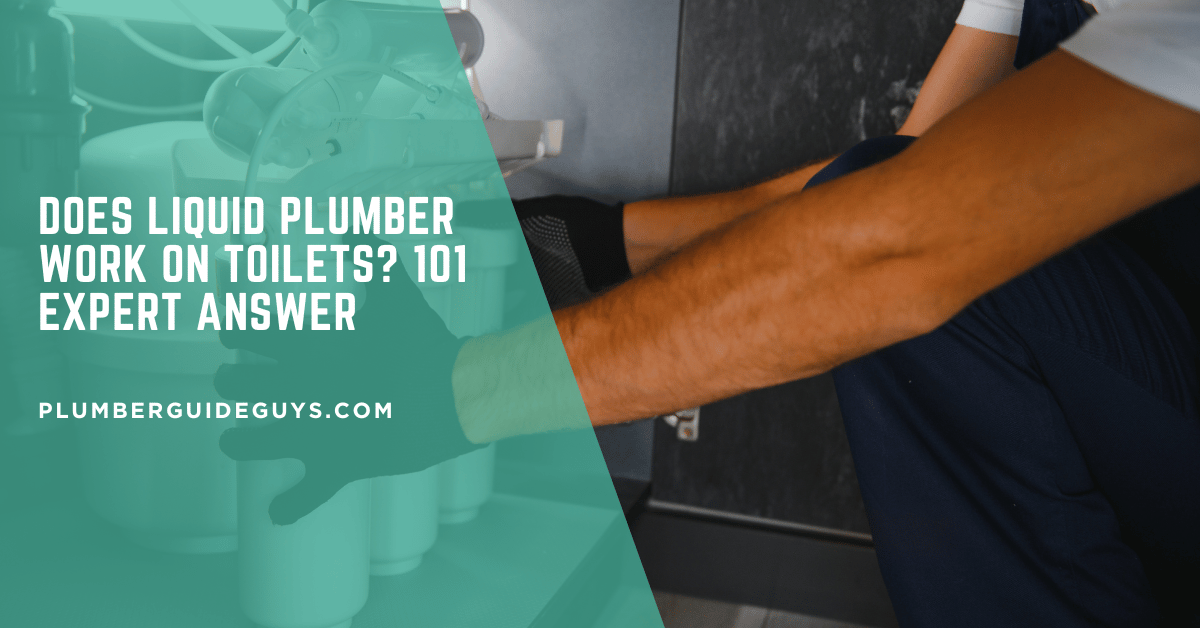Affiliate Disclosure
Plumber Guide Guys is a participant in the Amazon Services LLC Associates Program, an affiliate advertising program designed to provide a means for sites to earn advertising fees by advertising and linking to Amazon.
Does Liquid Plumber Work on Toilets? Ever thought about using Liquid Plumr for a toilet clog? Before you do, think twice. Plumbers say it can cause big problems and cost a lot.
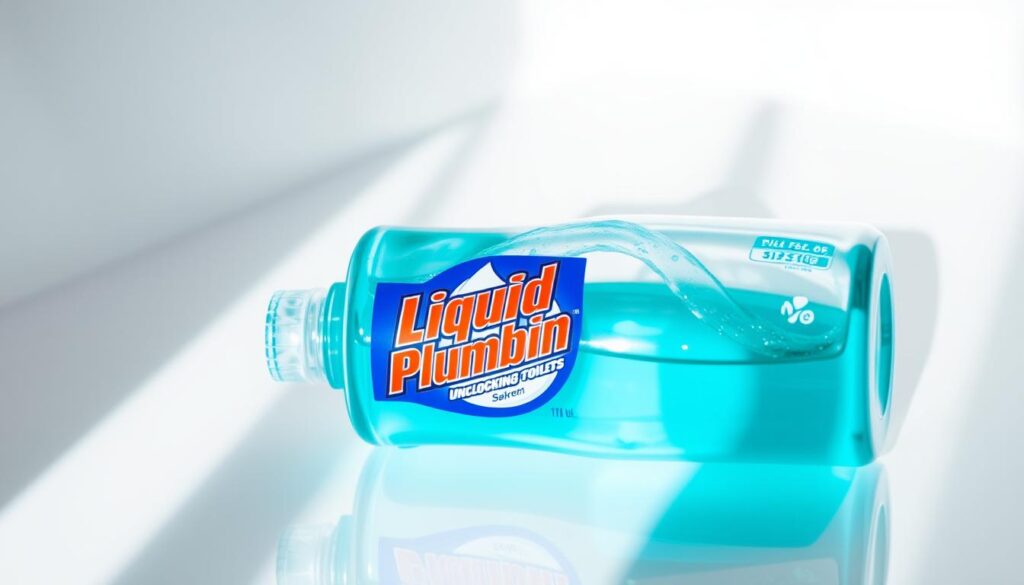
Many plumbers question Liquid Plumr’s use for toilet clogs. Chemical drain cleaners might seem easy, but they can harm your toilet.
To know if Liquid Plumber works on toilets, we need to look at its chemicals, risks, and safer options for fixing clogs.
Key Takeaways
- Liquid Plumber is not recommended for toilet clogs
- Chemical drain cleaners can damage porcelain surfaces
- Potential risks include pipe corrosion and long-term plumbing issues
- Professional plumbers advise against using chemical cleaners in toilets
- Alternative methods exist for safely unclogging toilets
Table of Contents
Understanding Liquid Plumber and Its Chemical Composition
Chemical drain cleaners like Liquid Plumr are strong solutions for tough clogs. Knowing what’s in them helps you decide if they’re right for your plumbing.
Liquid Plumr mixes many chemicals to tackle clogs. It’s often compared to toilet snakes in solving plumbing problems.
Common Active Ingredients
The main ingredients in these cleaners are:
- Sodium hydroxide (lye)
- Sodium hypochlorite (bleach)
- Aluminum compounds
- Sulfuric acid derivatives
How Chemical Drain Cleaners Function
These cleaners work by reacting chemically. They heat up and break down clogs by changing their molecules.
| Chemical Component | Primary Function | Effectiveness |
|---|---|---|
| Sodium Hydroxide | Dissolves organic matter | High |
| Bleach | Oxidizes and breaks down materials | Moderate |
| Aluminum Compounds | Generates heat reaction | High |
Safety Classifications and Warnings
Chemical drain cleaners are serious business. Always read product labels carefully and know the risks before you use them.
“Prevention is better than cure when dealing with chemical drain solutions.” – Plumbing Safety Expert
Even though they work well, these cleaners can harm your plumbing if not used right. Knowing what’s in them helps you choose safer options.
The Truth About Using Liquid Plumber in Toilets
Dealing with clogged toilets can be challenging, and chemical solutions like Liquid Plumr are tempting. Yet, experts advise against using them. They warn that these chemicals can harm your plumbing system.
Is liquid plumr safe for toilets? No, it’s not. These chemicals can damage your toilet’s parts. They can harm:
- Porcelain surfaces
- Pipe materials
- Toilet seals and gaskets
- Overall plumbing infrastructure
Using Liquid Plumber can lead to big problems. It can damage pipes and coatings and weaken your toilet’s plumbing. This can cost a lot to fix.
Chemical drain cleaners are a last resort – not a first solution.
Instead, try safer options. Use plungers, toilet augers, or get a plumber. These methods are better and won’t damage your plumbing. It’s cheaper to prevent problems than to fix them later.
Potential Risks and Damage to Plumbing Systems
Chemical drain cleaners like Liquid Plumr can be risky for your bathroom. They might damage your plumbing system when you try to clear clogs.
Chemical drain cleaners do more harm than just clear blockages. They can damage your home’s plumbing system badly.
Impact on Porcelain Surfaces
Harsh chemicals can harm your toilet’s porcelain surfaces. These chemicals can:
- Etch microscopic cracks in the toilet bowl
- Weaken the protective glaze
- Create permanent discoloration
Effects on Pipe Materials
Different pipes react differently to chemical cleaners. Older plumbing systems are more at risk. PVC, metal, and ceramic pipes can suffer:
- Accelerated corrosion
- Structural weakening
- Potential leaks and ruptures
Long-term Plumbing Consequences
Using chemical cleaners often can lead to costly repairs. The damage might need expensive pipe replacements, costing thousands of dollars.
Professional plumbers often advise against using chemical solutions for clogs.
Does Liquid Plumber Work on Toilets: Understanding Effectiveness
When you face a tough toilet clog, liquid plumber might look like a fast solution. But it’s key to know how well liquid plumr works on toilet clogs before using it. Not all drain cleaners are the same, and toilets need special care.
The success of liquid plumber on toilet clogs depends on a few important things:
- Type of blockage (organic vs. non-organic)
- Severity of the clog
- Composition of the obstruction
- Plumbing system materials
Liquid plumber is best for light organic blockages like:
• Hair
• Soap scum
• Soft debris
• Minor toilet paper accumulations
But, it might not work for tough clogs such as:
• Solid objects
• Mineral buildup
• Severe pipe obstructions
• Foreign items accidentally flushed
| Clog Type | Liquid Plumber Effectiveness | Recommended Action |
|---|---|---|
| Organic Soft Blockage | High | Chemical Treatment |
| Hard Foreign Objects | Low | Plunger or Professional Help |
| Mineral Deposits | Very Low | Mechanical Removal |
To understand if liquid plumber works on toilets, you must know its limits. Chemical drain cleaners can harm your toilet’s surface and pipes if used wrong. Always follow the product instructions and think about safer options for hard clogs.
Safety Precautions When Using Chemical Drain Cleaners
When you use chemical drain cleaners to unclog your toilet, your safety comes first. These cleaners are strong tools for keeping your bathroom drains clear. But, they need to be handled with care to avoid risks.
Before you start, make sure to take some important steps:
- Wear protective gear including chemical-resistant gloves
- Use safety glasses to protect your eyes from splashes
- Work in a well-ventilated area to avoid inhaling toxic fumes
- Keep children and pets away from the work area
Chemical drain cleaners have strong substances that can harm you if not used right. Always follow the instructions from the manufacturer. Never mix different cleaners, as it can lead to dangerous reactions.
Your safety is not just about wearing the right gear. You also need to:
- Read the entire product label before use
- Check your bathroom’s ventilation
- Have clean water nearby in case of accidental contact
- Wear long-sleeved clothing to minimize skin exposure
Remember, your health is more important than fixing a clog fast. If you’re not sure about using these cleaners, it’s best to call a professional plumber.
Impact on Different Types of Toilet Clogs
It’s important to know the type of toilet blockage you’re dealing with. Not all clogs are the same. The type of clog affects how you should fix it.
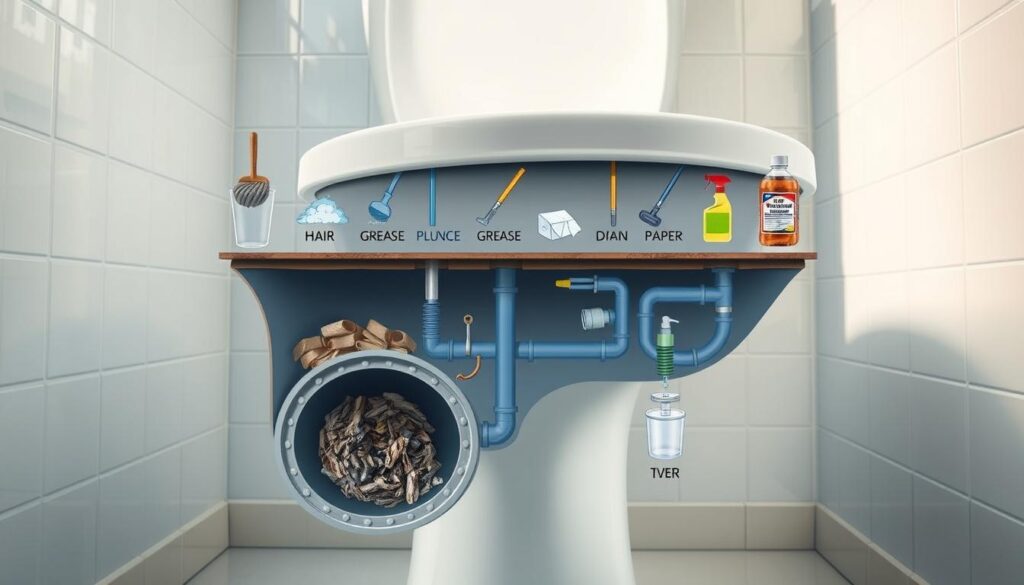
Toilet clogs fall into two main types. This determines how well chemical drain cleaners work:
- Organic Blockages: Made of things like waste, paper, and organic matter
- Non-organic Blockages: Caused by solid objects like toys, hygiene products, or foreign materials
Organic Blockage Characteristics
Organic blockages are the most likely to be fixed by liquid drain cleaners. These clogs are made of soft, break-downable materials. Liquid Plumber is best for clogs made of:
- Human waste
- Toilet paper
- Biodegradable debris
Non-organic Blockage Challenges
Chemical drain cleaners have a hard time with non-organic blockages. Solid objects like plastic toys or hygiene products need to be removed mechanically. In these cases, liquid plumr is not very effective, and you need other methods.
Clog Severity Levels
Toilet blockages vary in severity. This affects how you should treat them:
- Minor clogs: Can be fixed with chemical solutions
- Moderate clogs: May need more than one treatment
- Severe clogs: Require a professional plumber
Before choosing a solution, understand your clog’s characteristics. If unsure, it’s best to call a professional plumber for complex issues.
Environmental Concerns and Septic System Compatibility
Understanding the impact of chemical drain cleaners on the environment is key. Your septic system needs a balance of good bacteria to work right. Chemicals like Liquid Plumber can upset this balance, harming your septic system over time.
Chemical drain cleaners are not just bad for your plumbing. They can also pollute groundwater and soil. This pollution can harm local ecosystems.
- Chemicals can kill essential bacterial colonies in septic systems
- Groundwater contamination poses significant environmental risks
- Potential long-term damage to local ecological systems
For those looking for safe ways to clear clogs, there are better options. Natural enzymatic cleaners and tools like plungers are effective and safe for your septic system and the environment.
“Protecting your septic system is not just about maintaining your home, but preserving the broader environmental ecosystem.”
Choosing green methods for bathroom drain care helps your plumbing and the environment. It’s a win-win for everyone.
Alternative Methods for Unclogging Toilets
Chemical drain cleaners like Liquid Plumr might not always work for tough toilet blockages. Looking into other ways to clear clogs can help avoid damage. Here are some safe and effective methods for tackling toilet clogs.
Mechanical Solutions for Tough Clogs
Mechanical tools are great for tackling tough clogs without harming your pipes. The choice between Liquid Plumr and a toilet snake often comes down to mechanical tools:
- Plunger: Simple yet often the most effective tool
- Toilet Auger (Closet Auger): Reaches deeper blockages
- Toilet Snake: Precisely breaks through stubborn clogs
Natural Remedies for Minor Blockages
Try these eco-friendly options before using harsh chemicals:
- Baking Soda and Vinegar Method
- Pour 1 cup baking soda into the toilet
- Add 1 cup white vinegar
- Let it sit for 10-15 minutes
- Flush with hot water
- Hot Water Technique
- Boil water in a kettle
- Pour it into the toilet bowl carefully
- Wait and then flush
Professional Tools for Serious Clogs
For clogs that won’t budge, you’ll need professional tools:
| Tool | Effectiveness | Best Used For |
|---|---|---|
| Professional Drain Auger | High | Deep, stubborn blockages |
| Hydro-Jetting Equipment | Extreme | Comprehensive pipe cleaning |
| Specialized Toilet Cameras | Diagnostic | Identifying complex blockage sources |
Pro tip: Always choose mechanical and natural solutions over chemical drain cleaners to protect your plumbing system’s integrity.
Professional Plumbers’ Perspective on Chemical Cleaners
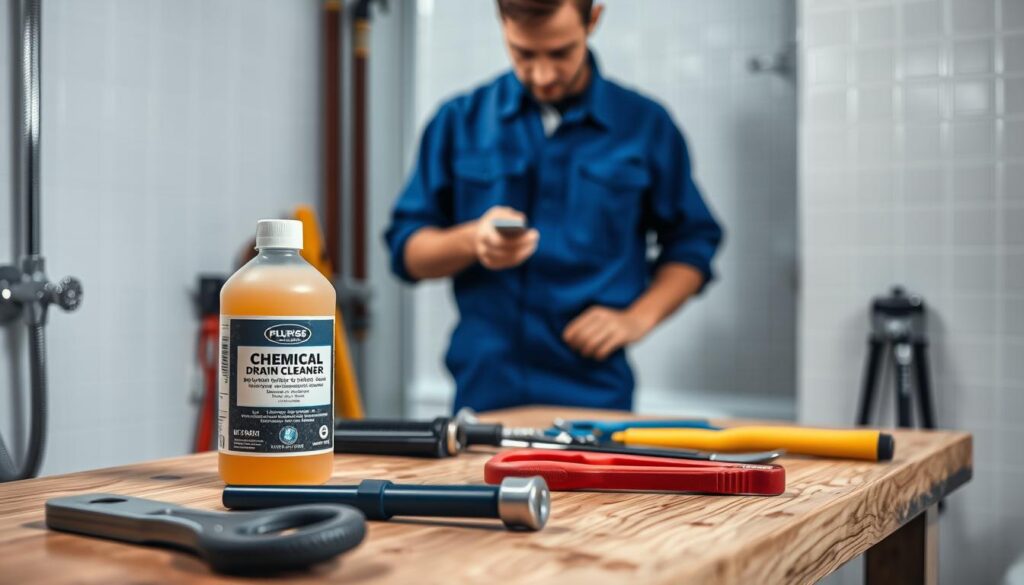
Professional plumbers often warn homeowners about the dangers of using chemical drain cleaners. They share important reasons why these products can be harmful.
They advise against using chemical drain cleaners for several key reasons:
- Chemical cleaners can severely damage pipe materials
- Harsh substances potentially corrode porcelain toilet surfaces
- Drain chemicals may create long-term plumbing system complications
Most plumbers suggest using mechanical methods to fix toilet clogs. They recommend:
- Plunging with specialized toilet plungers
- Using professional-grade drain augers
- Applying enzymatic drain treatments
- Conducting professional hydro-jetting services
“Chemical drain cleaners are a temporary solution that can create permanent problems,” says Mark Rodriguez, a master plumber with 20 years of experience.
If you have a persistent toilet clog, it’s best to call a professional plumber. They can find the root cause and fix it safely, without harming your plumbing.
Prevention Tips and Maintenance Practices
Preventing toilet blockages is better than fixing them later. Good bathroom drain care saves time, money, and plumbing troubles. A few simple steps can keep your toilet working well and avoid expensive fixes.
Here are key steps to protect your plumbing:
- Use toilet-friendly toilet paper that breaks down fast
- Don’t flush non-biodegradable items like wet wipes or hygiene products
- Install drain strainers to catch materials that could block
- Regularly check your toilet for early signs of problems
Regular upkeep is vital to avoid big toilet blockages. Try these proactive bathroom drain care methods:
- Flush with hot water weekly to clear small build-ups
- Use natural enzyme cleaners monthly
- Get a professional plumbing check-up every year
- Teach your family how to use the toilet right
Teaching your family about toilet care can lower blockage risks. Simple habits like using less toilet paper and not flushing wrong items help a lot. Being careful with water flow also improves your toilet’s performance over time.
Prevention is always cheaper and easier than cure when it comes to toilet maintenance.
By following these steps, you’ll cut down on plumbing emergencies. You’ll also keep your bathroom drainage system healthy and efficient.
When to Call a Professional Instead
Not every toilet clog can be fixed with liquid plumr or chemical drain cleaner. Some plumbing problems need a pro’s touch to avoid big damage and high repair costs.
Think about calling a professional plumber if you notice:
- Recurring toilet clogs that won’t go away after trying to fix them
- Unusual gurgling sounds from different fixtures
- Water backing up in various drains in your home
- Slow drainage in many plumbing fixtures
- Unexplained foul odors near toilets or drains
Professional plumbers have the right tools for tough toilet clog problems. Sophisticated camera inspections help find issues like:
- Tree roots in sewer lines
- Big pipe blockages
- Damage to the pipes
- Complicated septic system problems
Trying to fix complex plumbing issues with liquid plumr might seem to work. But it could harm your pipes in the long run. A pro can fix the problem right and save you from expensive repairs later.
Protecting your home’s plumbing system means knowing when DIY methods don’t work anymore.
Conclusion
When thinking about using liquid plumber on toilets, it’s best to avoid chemical drain cleaners. Your plumbing needs careful care and specific fixes that keep both the toilet and pipes safe. Chemical cleaners like Liquid Plumber can harm your plumbing and don’t really fix clogs well.
Is liquid plumr safe for toilets? The answer is no. Instead, go for mechanical fixes or call a pro. Tools like plungers and augers, or a plumber, are safer and more effective for tough clogs. Keeping your toilet in good shape is key.
Preventive care and quick action on clogs are the best strategies. Clean regularly, dispose of waste right, and get professional checks now and then. If you face a tough clog, a licensed plumber can help keep your toilet working right.
Protecting your home’s plumbing is all about making smart choices. While chemical cleaners might seem easy, they’re not worth the risks. Choose safer options that keep your toilet and plumbing system in top shape.
